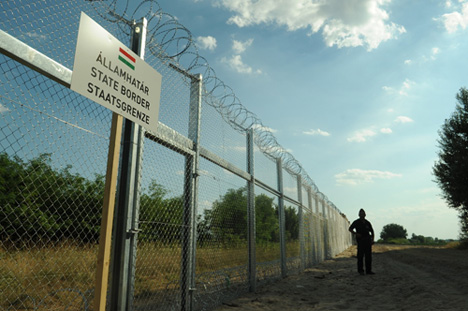
The Second World War no longer serves as a history of the western European present. The current era is marked by a different set of problems, not least the fading appeal of the model of democracy installed after 1945.
The hostile response of central and eastern European heads of state to the prospect of accepting Syrian refugees is emblematic of the parlous state of liberal democracy in the region, say Michal Simecka and Benjamin Tallis. Europe must avert a deepening East-West divide.
When the European Commission unveiled its plan for binding refugee resettlement quotas in April 2015, few had expected the governments of ex-communist Member States – which have no Middle Eastern or African immigrant communities to speak of – to warmly embrace the scheme. However, the intensity, hysteria and hypocrisy of the anti-migrant backlash shocked many, including some in the Visegrad countries themselves. Political cowardice and popular mistrust of supposedly liberal elites has allowed poisonous rhetoric directed at migrants to dominate, which risks political isolation and hinders common European action to address the crisis.

The Hungarian-Serbian border, 21 July 2015. Photo: Délmagyarország/Schmidt Andrea. Source: Wikimedia
Encouragingly, counter-currents of resistance to the xenophobic rhetoric and callous political expediency are starting to emerge in Central and Eastern Europe (CEE). Meanwhile, pressure is mounting on the Visegrad governments, meeting in Prague for an emergency summit on Friday, as it becomes increasingly clear that their approach is not only out of line with Europe’s moral responsibilities, but also out of line with key European states such as Germany and France.
However, these belated, weak and ineffective responses are symptomatic of deeper social and political problems in the Visegrad countries (Poland, the Czech Republic, Slovakia and Hungary). The migration crisis has exposed another crisis – of liberal democracy in post-communist societies.
It is regrettable – indeed “scandalous”, as French foreign minister Laurent Fabius put it – that on one of the few issues on which the Visegrad countries have made their collective voice heard, it contradicts European values and the ethos of the European Union. Given the region’s history, it is particularly concerning that Central Europeans are currently part of the problem rather than part of the solution.
With the Commission now pushing for an expanded relocation scheme – and Visegrad policymakers struggling to respond to the hundreds of refugees arriving via the western Balkan route – the stage is set for a deepening rupture along the East-West axis, pitting new member states against Berlin, Paris and Brussels. What is more, the latter’s position – and the domestic political currents that underlie it – threatens to undermine the hard-won gains of post-communist transition and European integration.
CEE states have long resisted pressure to take their share of the burdens as well as benefits of being part of the Schengen zone – one of the most popular aspects of EU membership in the region. Only grudgingly did governments acquiesce to the resettlement of miniscule numbers of refugees – and even this led to public outcry.
The political discourse has been almost surreal. Czech president Milos Zeman called for military deployments to police the country’s Schengen border and finance minister Andrej Babis calling for NATO to enforce a shut-down of Schengen external frontiers – respectively anathema to the logic of the Schengen zone and EU’s identity as a civilian power that positively engages its neighbours. Slovakia’s premier Robert Fico, eyeing parliamentary elections next spring, insisted that the country would only take “two hundred Christians” ostensibly due to a lack of mosques.
Hungary has faced the most significant influx of refugees and migrants, although most see it is a transit rather than a destination country. However, this has not stopped Viktor Orbán’s government from callously re-classifying virtually all refugees as “economic migrants”, fortifying the frontier and funding an anti-migrant publicity campaign.
Many (including politicians) blame the media for demonising migrants and stoking fears of alien hordes descending on Europe. Others claim that, despite some progress, ingrained intolerance in CEE societies has merely been transferred from Roma and sexual minorities to Muslims and foreigners in general. Indeed this argument has been cynically instrumentalized to dodge moral responsibility and excuse political inaction.
As elsewhere, hostility against migrants has gained traction with those in precarious socio-economic circumstances, but extends far beyond the “losers” of postcommunist transitions. Populist opportunists and xenophobes have found it easy to securitise migration through repeated and largely unchallenged incantation of migration myths. Groundless conflation of migration with terrorism and organised crime, humanitarian assistance to refugees with existential threats to European civilization and styling migrants as simultaneously job-stealers and a drain on state budgets is widespread. Tiny or (in many cases) marginalised migrant communities cannot effectively counter these claims.
These historical-cultural and structural arguments have some merit, but obscure the main problem: an abject failure of political leadership, which has its roots in the parlous state of liberal democracy in the region. Rather than being inevitable that right-wing populists would hi-jack the debate, this situation has arisen from the ineptitude, cowardice and outright cynicism of mainstream or notionally liberal elites.
Prevarication on resettlement quotas and failure to counter anti-migrant discourse ceded the strategic initiative to fringe groupings, such as Jobbik in Hungary, People’s Party in Slovakia or the Freedom party in the Czech Republic. While mainstream leaders may have sought to prevent an even more virulent anti-European backlash, things spun out of control. Fico’s warning that if “democratic Europe does not come up with a rational response” – meaning a tougher approach – “somebody else will, but using methods close to fascism” was not only thinly veiled hypocrisy but also a self-fulfilling prophecy. The upshot has been the simultaneous development of anti-migrant policy and a surge in right-wing extremism.
The failure of centrist Visegrad leaders is all the more evident when compared to the measured and responsible positions of Croatia’s Zoran Milanovic and even Serbia’s Aleksandar Vucic, who advocated tolerance, compassion and European solidarity. However, there are signs that some elite figures are waking up to the dangers of the unbridled anti-immigrant frenzy, as have ordinary people.
Slovakia’s President Andrej Kiska scolded the government for shirking its European responsibility and warned against framing the arrival of a “small number of refugees” as a “security, cultural or social catastrophe”. Senior figures in the Czech government – including foreign minister Lubomír Zaorálek – recently expressed “concern” over the tone of the debate, while deputy prime minister Pavel Belobrádek described Czech society as becoming increasingly “fascisized”. In Poland, the Civic Platform government eventually acquiesced to resettling 2000 Syrian refugees, despite concerns over forthcoming elections.
Poles have organized pro-migrant demonstrations and welcoming committees for new arrivals. The Czech scientific community issued a public appeal, signed by over 2000 scientists in a matter of days, against “hate and indifference”. Charles University in Prague announced this week it would grant full scholarships and free accommodation to students with asylum status.
In Hungary, NGOs have channelled local outpourings of concern into effective humanitarian assistance for migrants on the ground supported by some local governments, notably in Szeged, which is a main staging post along the migration route. A counter-attacking poster campaign has welcomed migrants and overtly apologized for the government and Orbán.
However, the problem with many of the well-meaning rejoinders noted above, particularly those of the elites, is that instead of stemming the tide of xenophobia, they risk inflaming a cultural war. Unlike on other contentious issues, such as reproductive, LGBT rights or minority rights, where public attitudes are split much more evenly, vocal supporters of more generous migration policy constitute a seemingly tiny group of liberal activists, intellectuals and politicians. Their detachment from the rest of the society – coupled with institutional power and privileged media access – is precisely what makes the migration debate so toxic.
As governments have looked the other way or offered only mealy-mouthed responses, other liberal elites have often resorted to patronizing language that dismisses, rather than engages with or allays the concerns of CEE populations. The “debate” thus descends into an acrimonious slanging match, a dialogue of the deaf, between a liberal minority convinced of its moral righteousness and populists posing as democrats – by virtue of being on the right side of public opinion – and claiming to defend Europe against the supposedly existential threat of migration.
CEE’s liberal elites need to overcome their countries victim mentalities and the inferiority complexes of transition, and to re-frame the migration debate in a narrative of the strength and resilience, rather than the vulnerability of European values. They need to address rather than ignore popular concerns and must dispel the xenophobes’ migration myths. The media can take inspiration from the German tabloid Bild and politicians should point to chancellor Angela Merkel’s bold and principled stance on migration as positively – as they do when it comes to prudent macro-economic management.
However, unlike in Germany, the region’s migration debate betrays a dangerous alienation of liberal elites – embodied in the Czech notion of the Prazská kavárna (the chattering classes of Prague’s Café Society) – from the wider population. This is the story of Civic Platform’s decline in Poland; of the rise of oligarch Andrej Babis’ anti-political managerialism in the Czech Republic; of the seemingly inescapable and self-inflicted purgatory of the Hungarian centre-left; and the calculating parochialism and vested interests of Zeman and Fico.
Liberal elites must show the leadership and courage to challenge, rather than pander to, prevailing opinions that undermine European values and responsibilities, but in ways that are firmly grounded in inclusive democratic politics. Failure to do so risks leaving CEE isolated as the tide turns towards a more generous and humane European approach to the migration crisis, but also risks the very gains of EU accession.
Published 9 September 2015
Original in English
First published by Can Europe make it? / openDemocracy, 4 September 2015
Contributed by openDemocracy © Michal Simecka / Benjamin Tallis / openDemocracy / Eurozine
PDF/PRINTSubscribe to know what’s worth thinking about.

The Second World War no longer serves as a history of the western European present. The current era is marked by a different set of problems, not least the fading appeal of the model of democracy installed after 1945.

Steady access to safe, drinkable water is still a privilege, and Europe is struggling with ever-worsening droughts. The new episode of the Standard Time talk show discusses chemical hazards, eco guerrillas, and why we can never have enough pelicans.